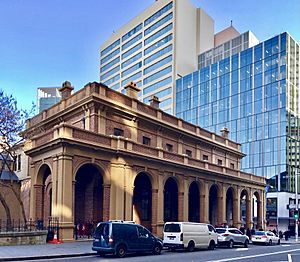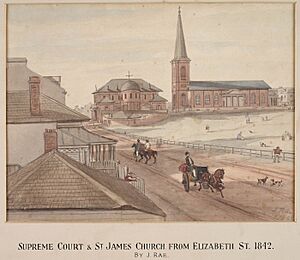Greenway Wing (Supreme Court of New South Wales) facts for kids
Quick facts for kids Greenway Wing(Supreme Court of New South Wales) |
|
|---|---|

Greenway Wing on King Street
|
|
| Location | Corner of King and Elizabeth, Sydney, City of Sydney, New South Wales, Australia |
| Built | 1820–1828 |
| Architect |
|
| Architectural style(s) |
|
| Owner | Department of Justice and Attorney General |
| Official name: Sydney Supreme Court House (Old Court House); Old Court House | |
| Type | State heritage (built) |
| Designated | 2 April 1999 |
| Reference no. | 800 |
| Type | Courthouse |
| Category | Law Enforcement |
| Lua error in Module:Location_map at line 420: attempt to index field 'wikibase' (a nil value). | |
The Greenway Wing is a special part of the Supreme Court of New South Wales. It's a courthouse that is listed as a very important old building, meaning it's protected. You can find it in the heart of Sydney, Australia, where King Street and Elizabeth Street meet.
Famous architects like Francis Greenway, Standish Lawrence Harris, and James Barnet helped design it. It was built a long time ago, between 1820 and 1828. People also call it the Sydney Supreme Court House (Old Court House) or simply the Old Court House. The government of New South Wales owns this building through its Department of Justice and Attorney General departments. It was added to the New South Wales State Heritage Register on 2 April 1999 because of its historical importance.
Contents
History of the Old Supreme Court House
The first Old Supreme Court House was designed by Francis Greenway, who was the main architect for the colony under Governor Macquarie. Greenway started designing it in 1819, and building began in 1820. However, Greenway was removed from his job before the building was finished in 1828. The Supreme Court started using the building in 1827.
Later, in the 1860s, another architect named James Barnet added more parts to the building. This courthouse is part of a group of important buildings designed by Greenway. These include the Hyde Park Barracks and St James' Church. They show how architecture changed from 1801 to 1875.
What the Building Looks Like
The Old Supreme Court building has two floors and is shaped like a rectangle. It started as a Georgian-style building. In 1868, a covered walkway (called a loggia) and a decorative top edge (called a cornice) were added. These changes gave the building a Victorian Italianate look. You can see this in the arched columns and the raised wall (called a parapet) that hides the roof.
Some of the original parts designed by Greenway are still there. These include the windows, fine details, recessed wall panels, arches, cedar wood fittings, the staircase, and a small dome (called a cupola) on the roof. This part of the building, along with the Old Registry and Banco Rd Court, forms the Supreme Court Group. Inside, there are offices for the Sheriff, legal rooms, judges' chambers, a library, and other offices. The Old Supreme Court is made of special bricks called sandstock brick, with decorated plaster details and a slate roof. The outside is mostly brick and plaster, with a slate roof.
The building is in good condition. The main additions made by Barnet include the loggia and later wooden parts.
Images for kids
Why the Building is Important
The Greenway Wing of the Old Supreme Court building is very important for several reasons. It's located at the corner of Elizabeth and King Streets.
- Historic Importance: It's one of only three buildings designed by Francis Greenway that are still standing in this area. The other two are the Hyde Park Barracks and St James' Church. This building shows how the early legal system worked in the colony. It was also part of Governor Macquarie's big plan for Sydney. The site itself is important because it was first chosen for Macquarie's public school, but then changed to be the Supreme Court.
- Design Importance: It's a beautiful example of the Old Colonial Georgian style, even with some changes. It was designed by Australia's first trained architect, Francis Greenway. This shows how important judicial buildings were in the early days of the colony.
- Location Importance: It stands out and is a key part of the Court group in Queen's Square. It's also part of the very first group of important public buildings in Sydney, along with the Hyde Park Barracks and St James' Church.
The building also has significant additions made later by James Barnet. The Sydney Supreme Court House was officially listed on the New South Wales State Heritage Register on 2 April 1999.








